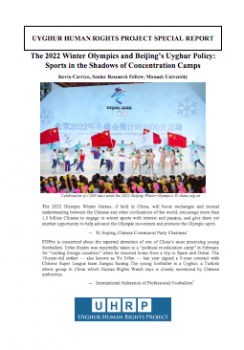UHRP BRIEFING: The 2022 Winter Olympics and Beijing’s Uyghur Policy: Sports in the Shadows of Concentration Camps

For immediate release
October 21, 2019 5:20 pm EST
Contact: Dr. Kevin Carrico (Skype) kevinjcarrico (Email) kevin.carrico@monash.edu
Contact: Uyghur Human Rights Project +1 (202) 478 1920
In 2015, Beijing was awarded the rights to host the 2022 Winter Olympics. While the government of the People’s Republic of China has overseen preparations for the 2022 Games under the motto of “joyful rendezvous upon pure ice and snow,” the same state has also overseen the development of a network of concentration camps in East Turkestan (also known as Xinjiang).
In a case of blatant profiling, inmates are detained not due to any crime, but solely due to their ethno-religious identity. Guilt is presumed for anyone of Uyghur, Kazakh, or other Turkic backgrounds. Camp inmates have been held without trial and without a sentence: in effect, indefinite secret detention. In addition, reports are emerging of a growing number of Uyghurs being sentenced to 10 or more years in prison, often without trial.
The Olympic Charter lists as one of the movement’s goals “the preservation of human dignity.” Such policies of racial profiling and arbitrary detention would be an outrage in any country participating in the Olympic movement, much less the host country.
In a new policy brief written for the Uyghur Human Rights Project, Dr. Kevin Carrico, Senior Research Fellow at Monash University, calls for urgent international attention to this looming challenge for the international community.
Entitled The 2022 Winter Olympics and Beijing’s Uyghur Policy: Sports in the Shadows of Concentration Camps, it outlines the political implications of the Olympic Games for the Chinese Communist Party, Beijing’s open contravention of the principles contained in the Olympic Charter, and actionable recommendations to the international community.
Dr. Kevin Carrico told UHRP: “Precisely because the Olympics and other mega-events have been so essential to the Chinese Party-state’s image management, the Games, with all of their symbolic weight, remain one of the few points of entry for the global community to apply pressure on the CCP. It is now well past time for the international community to use this leverage to push for change in China.”
The International Olympic Committee and the global community should not allow the Olympic Games to be used as a promotional celebration by a dictatorial regime holding millions in concentration camps based on their ethnicity. Instead, the international community needs to use the Olympic Games to push for substantial and verifiable change in China’s policy.
Among several recommendations, the policy brief calls on:
The International Olympic Committee to:
· Immediately inform China that its policies in Xinjiang are in violation of the ideals of the Olympic Charter.
National Olympic committees and political leaders of countries around the world to:
· Inform the IOC that current policies in Xinjiang are incompatible with the Olympic Charter, and inform China that participation in the 2022 Olympic Games is not feasible without substantial change in Xinjiang.
The general public to:
· Sign the “No Rights, No Games 2022” petition urging the International Olympic Committee to take action to ensure that the Games are not held in a country holding millions in concentration camps.
· Clearly voice opposition to current Chinese government policies in Xinjiang to the International Olympic Committee, national Olympic committees, governments, and advertising sponsors of the 2022 Winter Games
“Beijing needs to hear from athletes, coaches and corporate sponsors. Hosting a global event requires meeting international standards, especially human rights. The Olympics cannot be put in the position of whitewashing the Chinese Communist Party’s crimes under international treaties that it has itself ratified,” said UHRP Director, Omer Kanat.
Mr. Kanat added: “For the International Olympic Committee to be handing out medals while Uyghurs and other Turkic peoples remain in ethno-religious concentration camps would be a historical mistake. The International Olympic Committee, National Olympic committees, political leaders, and concerned individuals need to act now to persuade China to close the camps and avert a train wreck.
The 2022 Winter Olympics and Beijing’s Uyghur Policy: Sports in the Shadows of Concentration Camps can be downloaded here: https://docs.uhrp.org/pdf/2022Olympics.pdf
